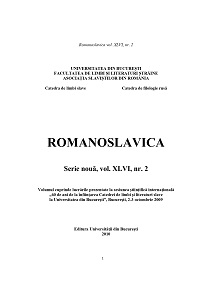Deconstrucţia canonului literar în critica actuală română şi sârbă
Deconstruction of the literary canon in current Romanian and Serbian criticism
Author(s): Mariana DanSubject(s): Recent History (1900 till today), Comparative Study of Literature, Romanian Literature, Serbian Literature, Theory of Literature, Sociology of Literature
Published by: Editura Universităţii din Bucureşti
Keywords: the canons of Romanian literature; avant-garde; myth-formation; Serbian literature;
Summary/Abstract: Both Romanian and Serbian literary critics have recently tried to re-evaluate the literary achievements of the past from a nowadays perspective. In Romania, Eugen Negrici, tries to “demystify” a whole Romanian cultural background envisaging the fact that the specific historical, political and social facts were favourable for the process of myth formation. As myth is viewed as ideology and mentality, literature and literary critics are presented as its supportive factors. In his multidisciplinary study, Negrici, while not believing in the possibility of the diachronic evolution of literature any longer, still believes in the evolution of mentality and society – which is a paradox. His deconstruction of the literary process, which envisages the reader, the writer, the literary critic and the issue of reception, is, at times, mordant and his evaluation is not necessarily followed by a constructive re-evaluation. The main idea of the book, which is the need of Romanian literature to synchronize with other European literatures, is old, and was already described in Romania in Eugen Lovinescu’s studies, prior to World War II. According to Negrici, it is the Romanian mentality in the first place that is due to ‘evolve’. In Serbia, Gojko Tešić’s study represents an endeavour to re-evaluate and rehabilitate some very important writers of the 20th century Serbian literature, in spite of the bios perspective of more generations of literary critics and university professors. While presenting, by numerous examples and in a convincing way, the evolution of modern Serbian poetry, Tešić discloses the interrelation between modernism and avant-guarde, which, only taken together constitute a paradigm in Serbian 20th century literature. The fact is interesting that the poet Vasko Popa, of Romanian origin, but who wrote in Serbian, represents, in Tešić’s opinion, a landmark in nowadays poetry, and a point of reference from which the literature of the past can be reshaped and ’refreshed’ by a new and productive critical outlook. The comparison between the Romanian and Serbian critics’ approaches is very interesting, as it reveals that while many important Romanian writers are rejected by some Romanian criticists from an a priori perspective, the same writers are highly appreciated abroad. It is the case of numerous Romanian writers to have had a better reception abroad than in Romania. This leads to the conclusion that critics like Negrici, while trying to demistify the canons of Romanian literature, involve in a new process of myth-formation, which is not in favour of Romanian literature.
Journal: Romanoslavica
- Issue Year: XLVI/2010
- Issue No: 2
- Page Range: 9-23
- Page Count: 15
- Language: Romanian

